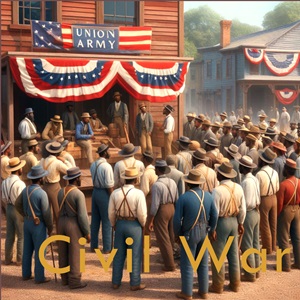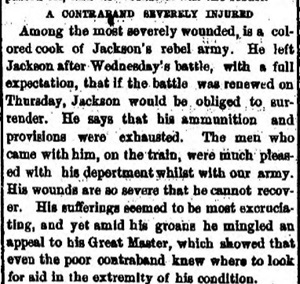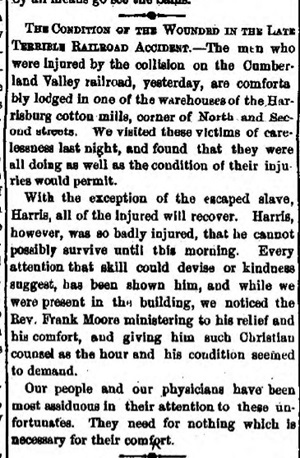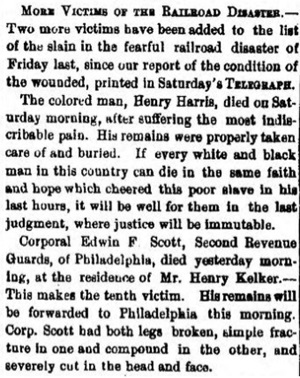

Study Areas
Henry Harris: Harrisburg Buries a Black Confederate Soldier
Henry Harris was, by his account, a cook with Stonewall Jackson’s troops. He was captured the day after the Battle of Antietam, having been separated from the Confederate army in the confusion following the battle. He surrendered to Union troops after running out of ammunition and food. Harris was first taken to Greencastle, in Franklin County, and then forwarded to Harrisburg by train a week after the battle, along with the Twentieth Pennsylvania Militia regiment.

On the morning of 26 September, about one-half mile before reaching the Cumberland Valley Railroad Bridge over the Susquehanna, the troop train collided on a foggy morning with an engine that was sitting on the tracks waiting for clearance to cross the bridge into Harrisburg. The force of the collision caused the first three wooden troop cars to accordion together, killing eight soldiers and severely injuring more than fifty, including Harris, whose injuries were so extreme that he was not expected to survive.
The injured men were all brought across the bridge and cared for in the warehouse room of the Cotton Mill, on North Street. All during the next day, Harris was tended to by a local clergyman, the Reverend Frank Moore, who provided for his comfort and gave “such Christian counsel as the hour and his condition seemed to demand.” The black Confederate soldier suffered mightily, and died of his injuries on Saturday morning, the 27th of September, 1862. The newspaper reported, “His remains were properly taken care of and buried.”

It is almost certain that Henry Harris’ body was turned over to Harrisburg’s African American community for burial. In the most likely scenario, he was given at least a brief service by members of either the Wesley Union or Bethel A.M.E. church, and his remains were then conveyed out of town along Ridge Road to the small African American burial yard just beyond the reservoir. It was probably in this manner that Harrisburg buried its first, and only, African American Confederate soldier.
Was Henry Harris a "soldier?" The news articles described Harris as a "contraband" and an "escaped slave." As an enslaved cook with the Army of Northern Virginia, he was most likely a noncombatant. He probably wore a Confederate uniform, and notably did not surrender to Union troops until defeat seemed likely and food and ammunition exhausted.

Sources
Pennsylvania Daily Telegraph, 16 September 1862.
Ibid., 26, 27, 29 September 1862.
This appears to be the only instance of
the burial of a Confederate African American soldier in Harrisburg.
If he was buried in the African American graveyard on Ridge Road, which
was the only active African American cemetery in Harrisburg during
the war, then it is probable that his remains were eventually re-interred
in Lincoln Cemetery after 1877. It is possible, but less likely, that
his remains were interred on the grounds of the county poor house.
This article is excerpted from The Year of Jubilee, chapter nine.
